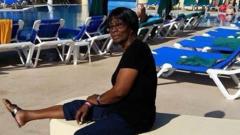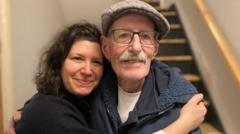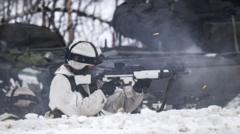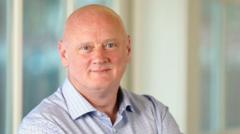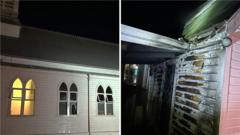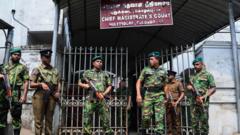The recent mass shooting at a school in Orebro, Sweden, has left immigrant communities in shock and fear. As the investigation unfolds, many are questioning the societal and political narratives that may contribute to such an act of violence.
Immigrant Communities in Sweden Grieve After Tragic School Shooting
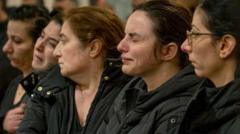
Immigrant Communities in Sweden Grieve After Tragic School Shooting
As the nation mourns the devastating mass shooting in Orebro, concerns rise over safety in immigrant neighborhoods and the underlying causes of such violence.
In the aftermath of Sweden's deadliest mass shooting, communities in Orebro, particularly those with immigrant backgrounds, are grappling with fear, grief, and the search for answers. The horrific event unfolded at the Risbergska school, where a gunman, reportedly a local white Swedish man, killed ten individuals including members of the Syrian and Bosnian immigrant communities before taking his own life. The tragedy has left many in these communities on edge, fearing for their safety in a society they hoped would offer refuge.
Jacob Kasselia, a Syrian Orthodox priest, reflected on the loss of congregation member Salim Iskef, a kind-hearted individual who fled Aleppo with his family to escape war. Kasselia's words resonate deeply within the community, highlighting the intense sorrow and confusion about why such violence was directed at a school primarily attended by immigrants.
The police investigation, which has yet to confirm details about the gunman or the victims, has only heightened the anxiety among residents. Nour Afram, a Syrian immigrant and witness to the attack, expressed that the lack of information from authorities has intensified feelings of uncertainty and fear regarding the targeted nature of the shooting.
Prominent voices in Orebro, including academic researchers and community leaders, have noted a broader context of rising anti-immigrant sentiment reflected in political rhetoric. Tomas Poletti Lundstrom emphasized that the societal climate is deeply troubling, connecting contemporary struggles of immigrant communities in Sweden to the rhetoric surrounding immigration.
Visibly shaken, Zaki Aydin, a teacher of Syriac language, has felt compelled to tighten security measures in his classroom in response to the attack. Young residents like Gabriel described the incident as a "nightmare," indicating a loss of innocence as concern over school safety spreads among their peers.
As the local government and law enforcement grapple with the implications of the shooting, many community members are united in their mourning and need for clarity. The mayor of Orebro and other officials have called for patience as the police work to uncover the motives behind this tragedy, which remains shrouded in uncertainty. Meanwhile, the Syrian, Turkish, and Iraqi congregations held emotional memorial services, coming together to remember those lost and to support the grieving families in their darkest hour.
Kasselia encapsulated the struggle to comprehend such violence, questioning how to make sense of an act that defies understanding. While authorities assert that the gunman acted alone, the lingering concerns about the broader attitudes that foster hate remain at the forefront of discussions in the community.
As the investigation progresses, residents of Orebro hope for answers that might bring closure to this traumatic chapter while also urging a critical examination of the societal factors contributing to such brutal acts of violence.
Jacob Kasselia, a Syrian Orthodox priest, reflected on the loss of congregation member Salim Iskef, a kind-hearted individual who fled Aleppo with his family to escape war. Kasselia's words resonate deeply within the community, highlighting the intense sorrow and confusion about why such violence was directed at a school primarily attended by immigrants.
The police investigation, which has yet to confirm details about the gunman or the victims, has only heightened the anxiety among residents. Nour Afram, a Syrian immigrant and witness to the attack, expressed that the lack of information from authorities has intensified feelings of uncertainty and fear regarding the targeted nature of the shooting.
Prominent voices in Orebro, including academic researchers and community leaders, have noted a broader context of rising anti-immigrant sentiment reflected in political rhetoric. Tomas Poletti Lundstrom emphasized that the societal climate is deeply troubling, connecting contemporary struggles of immigrant communities in Sweden to the rhetoric surrounding immigration.
Visibly shaken, Zaki Aydin, a teacher of Syriac language, has felt compelled to tighten security measures in his classroom in response to the attack. Young residents like Gabriel described the incident as a "nightmare," indicating a loss of innocence as concern over school safety spreads among their peers.
As the local government and law enforcement grapple with the implications of the shooting, many community members are united in their mourning and need for clarity. The mayor of Orebro and other officials have called for patience as the police work to uncover the motives behind this tragedy, which remains shrouded in uncertainty. Meanwhile, the Syrian, Turkish, and Iraqi congregations held emotional memorial services, coming together to remember those lost and to support the grieving families in their darkest hour.
Kasselia encapsulated the struggle to comprehend such violence, questioning how to make sense of an act that defies understanding. While authorities assert that the gunman acted alone, the lingering concerns about the broader attitudes that foster hate remain at the forefront of discussions in the community.
As the investigation progresses, residents of Orebro hope for answers that might bring closure to this traumatic chapter while also urging a critical examination of the societal factors contributing to such brutal acts of violence.



